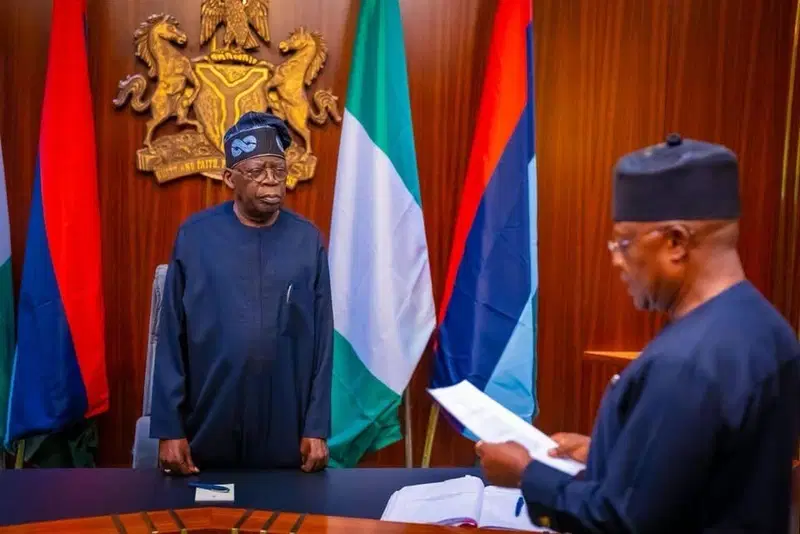The corridors of Aso Rock Villa have often been the setting for political drama, backroom negotiations, and high-stakes meetings that shape the trajectory of Nigeria’s governance. On this particular evening, a different kind of urgency seemed to fill the air. The time was minutes to six when Vice Admiral Ibok-Ete Ibas (retd.), the former sole administrator of Rivers State, arrived at the presidential villa. Dressed in a brown native attire that suggested calmness and humility but perhaps also attempted to project a quiet confidence, he was ushered into the waiting halls of power. The retired naval chief had only recently concluded his controversial six-month stint as the sole administrator of one of Nigeria’s most oil-rich states, a position born out of a political emergency rather than democratic mandate. But his presence at the seat of power in Abuja on this day was not ceremonial; it was one steeped in questions, suspicions, and the shadow of accountability.
Shortly before his arrival, the Minister of Finance and Coordinating Minister of the Economy, Wale Edun, had been sighted walking briskly into the villa. In his hand, he carried a file that appeared to contain the kind of financial records and documents that could make or mar a man’s legacy. Moments later, Edun stepped out briefly, only to return with the same file, now seemingly heavier with the weight of its contents. Following closely behind was Ola Olukayede, the Chairman of the Economic and Financial Crimes Commission (EFCC), a man whose appearance in such matters rarely signified good news for the subject of inquiry. Together, the three men formed the centerpiece of what insiders quickly described as a closed-door session convened by President Bola Ahmed Tinubu himself, an audience meant to clarify, interrogate, and perhaps demand answers to what many in the public had already begun whispering: What exactly happened to Rivers State’s money during the six months of emergency rule?
To understand the gravity of this encounter, one must return to March 2025, when the political landscape of Rivers State was thrown into turmoil. A crisis between Governor Siminalayi Fubara, his deputy, and the House of Assembly led the President to declare an emergency, effectively suspending democratic governance and installing Vice Admiral Ibok-Ete Ibas (retd.) as sole administrator. It was a move justified by the government as necessary to restore order and protect the interests of the state. For six months, Ibas governed the oil-rich region with near-absolute powers, overseeing revenues, contracts, and state expenditures without the usual checks of a sitting legislature. By September 17, the emergency rule had ended, and democratic actors, including Fubara and the Assembly, were reinstated. Yet as the curtain fell on Ibas’ tenure, questions emerged about the transparency of financial dealings during that period.
The Rivers State House of Assembly, now back in session under Speaker Martin Amaewhule, wasted no time in announcing its intention to probe the state’s expenditures under emergency rule. Their resolution was pointed: they would examine the spending patterns, contract awards, and the withdrawals from the consolidated revenue fund during Ibas’ tenure. The legislative body insisted it was their duty to “explore the process of knowing what transpired during the emergency rule with regard to spending,” an assertion that resonated strongly with the people of the state who had been kept in the dark for months. But Ibas, in an unusual show of defiance, outrightly rejected the Assembly’s decision, dismissing the probe as unnecessary and unfair. It was this defiance, paired with the sheer size of funds that had flowed into Rivers during the six-month period, that elevated suspicions and ultimately led to his summons to Aso Rock.
Between March and August 2025, Rivers State received a staggering N254.37 billion from the Federation Account Allocation Committee (FAAC). For a state already buoyed by its oil wealth, this inflow represented enormous financial muscle—money meant for infrastructure, salaries, education, healthcare, and the welfare of millions of citizens. Yet, to many, little tangible evidence existed on the ground to justify such expenditures. Roads remained in disrepair, hospitals struggled with inadequate equipment, and teachers complained of delays in allowances. Where had the money gone? The whispers on the streets suggested waste, mismanagement, and possible diversion of funds. For a man who had walked into office under the guise of restoring order, Ibas now found himself walking into Aso Rock under the shadow of suspicion.
The involvement of the EFCC Chair, Ola Olukayede, was a telling sign that the matter had gone beyond routine questioning. The EFCC had been monitoring state finances across the country, but the Rivers case carried unique political undertones. With the state Assembly already clamoring for accountability, civil society organizations joining the chorus, and the public demanding transparency, the federal government could ill afford to ignore the matter. Tinubu himself, whose administration had branded its governance framework as the “Renewed Hope Agenda,” faced the test of proving whether accountability was just a political slogan or a real principle that would guide his presidency.
Inside the villa, it is believed that President Tinubu pressed Ibas for detailed explanations of the N254.37 billion allocations, focusing on contract awards, revenue expenditures, and the absence of documented reports to the reinstated Assembly. Edun, armed with financial records, was said to have laid out discrepancies between revenues received and expenditures reported. The President, according to sources familiar with the proceedings, demanded clarity on whether due process had been followed in the award of contracts, and why several multi-billion naira projects remained incomplete despite payments allegedly being made.
The timing of the meeting was also significant. With Rivers State now politically fragile, and Governor Fubara resuming office under a cloud of past suspensions, the federal government had to tread carefully. A full-blown financial scandal implicating Ibas could trigger political aftershocks that would ripple far beyond Port Harcourt. The state, after all, remained one of Nigeria’s critical economic engines, a hub of oil revenue, and a hotbed of political influence. Tinubu’s decision to personally summon Ibas, alongside the finance minister and the EFCC Chair, underscored how seriously the presidency viewed the issue.
But the matter was not simply about money. It was also about precedent. If an emergency rule administrator could walk away without accounting for billions of naira, what message would that send about Nigeria’s fragile democracy? Would it embolden future administrators to treat public funds as personal spoils during times of crisis? Or would the case of Ibas become a turning point, where Nigeria’s leadership finally drew a red line between governance and mismanagement? These were questions lingering in the minds of both observers and citizens as the villa doors remained shut for hours.
Outside, reactions were already mounting. Civil society groups called for full disclosure of Rivers State’s financial records during the six months, demanding that accountability should not be swept under the rug. Social media amplified these calls, with many Nigerians pointing out that ordinary citizens bore the brunt of mismanagement while politicians and administrators lived lavishly. Critics of the administration warned that any attempt to shield Ibas from scrutiny would further erode public trust in Tinubu’s government. Supporters of the President, on the other hand, argued that the very fact that such a meeting was convened reflected Tinubu’s seriousness about accountability.
For Ibas himself, the meeting represented a critical juncture. His naval career had been marked by discipline, order, and a commitment to hierarchy. But his political foray as Rivers’ administrator had placed him in a different kind of battlefield—one where perception mattered as much as performance, and where accountability was demanded not by superiors but by the public. His rejection of the Assembly’s probe might have shielded him temporarily, but in Aso Rock, before the President and EFCC, there was no easy escape.
As night fell over Abuja and the villa lights remained on, one thing became clear: this was not a routine debrief. It was the beginning of an unfolding story about money, power, and accountability in one of Nigeria’s most important states. Whether Ibas would emerge vindicated, indicted, or politically bruised remained to be seen. But what was certain was that the meeting had opened a new chapter in the quest to answer a fundamental question: What truly happened to N254.37 billion of Rivers State’s money during six months of emergency rule?
By the time the meeting ended, no official statement had been released. Silence, for now, reigned from the corridors of power. But silence would not quell the growing demand for answers. The people of Rivers, and indeed Nigerians at large, wanted to know whether this was yet another story of squandered opportunities or the beginning of long-overdue accountability. The coming weeks would reveal whether Tinubu’s summons was a mere political gesture or the start of a full investigation that could change the narrative of governance in Nigeria’s oil-rich heartland.
This unfolding episode carries implications that extend far beyond Rivers State. It tests the credibility of institutions, the resolve of the presidency, and the ability of Nigeria’s democracy to hold its leaders accountable. As the nation waits for clarity, one thing is certain: the story of Ibas and the billions in Rivers will remain etched in the political consciousness of Nigeria for a long time to come.




